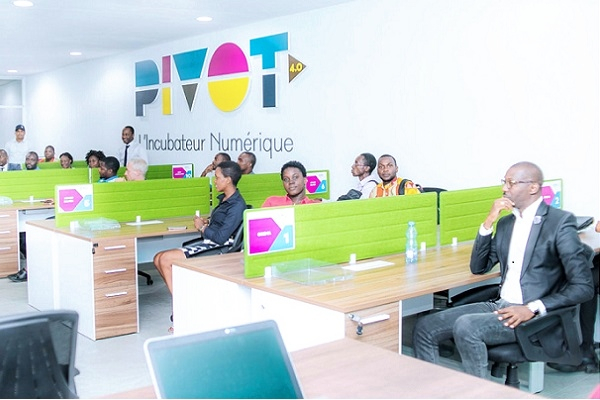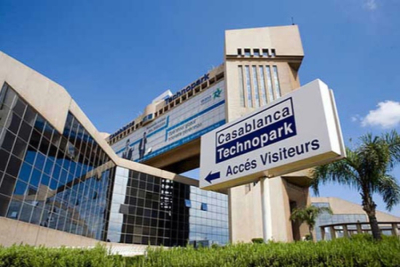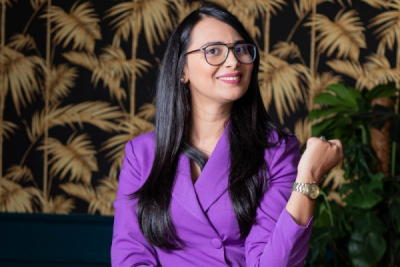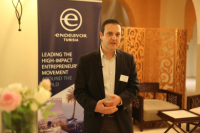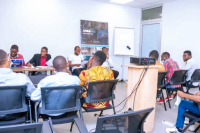
TECH STARS (1007)
He is an outstanding example of an African entrepreneur who is harnessing blockchain technology to generate a positive impact both on his continent and on the world stage.
Cameroonian-born entrepreneur Ricardo Konlack (photo) is a blockchain enthusiast. As the co-founder and CEO of IoT firm Katika, he is actively involved in revolutionizing the financial landscape in Africa through the adoption of this innovative technology.
His platform, Katika, stands out for its ability to offer innovative solutions perfectly adapted to the needs of African entrepreneurs. It facilitates rapid and secure payments, offers access to credit without the need for intermediaries, encourages savings, and enables investment in local projects.
Katika's mission is to promote financial inclusion, stimulate economic development, and enhance digital sovereignty in Africa. It uses blockchain to establish trust between users, reduce costs, increase transparency, and guarantee data protection. Its platform relies on an active, committed community that contributes to its governance and development.
The platform has benefited from support from several local and international incubators and accelerators, including Founder Institute and ActivSpaces.
Ricardo Konlack graduated from Germany's Technische Hochschule Mittelhessen in 2020, with a degree in civil engineering. The entrepreneur's first company is BrickBuilding, which designs, manufactures, and distributes products for civil engineering, architecture, construction, and public works.
Melchior Koba
SING plays a key role in the digital ecosystem in Gabon and the Central African region as a whole. It provides solutions tailored to the needs of entrepreneurs, businesses, and institutions.
SING (Digital Incubation Society of Gabon) is a private company specializing in digital innovation. Founded in 2018 by business management consultant Yannick Ebibie, it primarily aims to help boost the competitiveness of African businesses by promoting digital transition.
With its PIVOT 4.0 incubator, SING offers customized programs to support the development of digital start-ups. It selects and supports innovative projects in various sectors such as digital, energy, agriculture, health, and education. Start-ups benefit from tailored support, access to state-of-the-art infrastructure, a network of mentors and experts, and financing opportunities.
The incubator also offers training courses leading to qualifications and certification in digital-related fields such as web development, design, digital marketing, and cybersecurity. These courses are accessible at all levels and are designed to enhance learners' skills.
SING also supports companies and institutions in their digital transformation by providing auditing, research, strategy, and customized digital solutions.
Since its creation, SING has supported over 50 digital startups in Gabon, some of which have won national and international awards. In addition, SING has been a key player in the organization or co-organization of digital-related events, such as hackathons, conferences, and workshops. Its ambition is to contribute to the creation of 20,000 jobs in information and communication technologies (ICT) in Gabon by 2025 and to foster the emergence of national digital innovation champions.
Some of the companies it supported include Ultimate CRM, an online prospecting platform designed to improve the sales force, and Ekena, a start-up focused on promoting local tourism through the development of digital solutions for all players in the value chain.
Its partners include the World Bank, Deloitte, eGabon, Gabon Telecom, Vivendi Africa, Total Gabon, and the Ministry of Digital Economy, Communication, and Post.
Melchior Koba
Technopark is a key player in innovation in Morocco. It helps revitalize the country’s economic fabric and promote youth entrepreneurship.
Launched in 2001 in Casablanca, Technopark is the first technology business incubator to be established in Morocco. It was established by MITC (Moroccan Information Technopark Company), a B2B service company, as a public partnership between the Moroccan Ministry of Industry, the World Bank, the national deposit and consignment fund CDG, Banque Centrale Populaire (BCP), and the now dissolved private equity firm ONA.
Technopark's mission is to facilitate the creation and growth of innovative companies operating in the fields of information and communication technologies (ICT), green technologies (greentech), and the cultural industry. It offers an environment conducive to the growth of start-ups, with a wide range of services including accommodation, mentoring, training, access to financing, market access, visibility, and networking.
Since its creation, Technopark has supported over 3,500 innovative companies, creating more than 15,000 direct and indirect jobs. It currently operates on five sites - located in Casablanca, Rabat, Tangier, Souss-Massa, and Agadir - hosting over 450 companies and regularly serving as a venue for events focused on innovation and entrepreneurship.
The incubator aims to be a strategic catalyst for Morocco's innovative entrepreneurial ecosystem, extending its model to other regions of the country. In the fourth quarter of 2023, Technopark Essouira will be inaugurated, and three other sites planned for Fez, Tiznit, and Oujda will launch in 2024. These new innovation centers will help support local start-ups and foster synergies between the various players in these regions.
Melchior Koba
She left the French pharmaceutical company Sanofi-Pasteur to fully devote herself to her passion: fashion. Her startup is now an industry leader in the Middle East and Africa, with a presence in Tunisia, Morocco, Algeria, and Egypt.
Ameni Mansouri (photo) is a young Tunisian entrepreneur better known as the co-founder and CEO of Dabchy, a fashion marketplace inspired by the European platform Vinted.
With a degree in biomedical engineering and biotherapy, she left her job at Sanofi-Pasteur to devote herself to promoting fashion and creating a community of fashion enthusiasts.
In 2016, she officialized Dabchy and, currently, the company boasts over a million users in the MENA region, offering the opportunity to sell and buy new and second-hand clothes at affordable prices, while being a sort of social network encouraging interaction between users. The platform generates revenue through commissions on transactions and offers secure delivery and payment services.
Ameni Mansouri wants to make her platform the leading reference for circular fashion in the Middle East and Africa, contributing to ecological transition in the textile industry. With that purpose in mind, in August 2023, Dabchy expanded operations into Egypt, consolidating its position as a major regional fashion player.
“This expansion fills us with pride, as it symbolizes Tunisia’s influence through its young and promising startup scene. We are determined to uphold the Tunisian values that have propelled us this far: innovation, creativity, and above all, trust in our community,” said Ameni Mansouri.
Over the course of her entrepreneurial career, the latter has won several awards. In 2018, she was selected among TechWomen and her start-up was recognized as one of Africa's top 100 at the Africa Forum.
In 2019, Dabchy became the first Arab and African company to be selected by Look Forward, a French incubator specializing in technological fashion. The same year, Ameni Mansouri was named one of Forbes' "30 under 30" in the Middle East.
Melchior Koba
Over the years, she acquired extensive professional experience working for various marketing and consulting firms. She now heads her startup, which enables customers to conveniently save towards the purchase of expensive goods.
Juliet Shiro Njoroge (photo) is a Kenyan entrepreneur and experienced marketing professional. She graduated from the University of Nairobi with a Bachelor's of Law in 2016.
In 2021, she co-founded Mosmos, a goal-based savings-to-purchase platform that helps people in emerging markets buy expensive items without stressing over going into debt and even earning cash rewards for their purchase.
Through its platform, Mosmos enables its users to save to buy several items, from electronics and home appliances to decor supplies. With its flexible payment system, it allows its clients to avoid debts. It even rewards its most active and regular clients.
In March 2023, on the sidelines of International Women's Day, the company was selected to be part of the first cohort of the Google for Startups Accelerator: Women Founders (Africa). Five months later, in August, it was selected as one of 20 African startups to take part in the fourth edition of The Future is Female Mentoring program. In the same month, it raised $66,000 from Catalytic Africa.
Throughout her career, Juliet Shiro Njoroge has held several positions in many different fields. Brand Ambassador of the YUSUDI professional skills development training program, between 2015 and 2016, she worked for Trinc Media as an account manager. In 2017, she joined the Catapult Brand Consulting agency as a digital account manager. The following year, she was hired by Ogilvy, an advertising company, as an account manager.
In 2019, she became head of marketing and key accounts at Turaco, a micro-insurance tech company. A year later, she was appointed marketing and communications consultant at BFA Global, a consulting firm specializing in financial and digital innovation. Between 2021 and 2022, she successively held the positions of Marketing Manager and Head of Partnerships and Offline Growth at Koa Technology.
Melchior Koba
TOogueda strives towards the creation of an entrepreneurial ecosystem conducive to growth in Guinea. It supports the emergence of a new generation of entrepreneurs, therefore contributing to the creation of added-value and decent jobs as well as wealth generation.
TOogueda is a platform focused on the development of start-ups, and micro, small, and medium-sized enterprises in Guinea. Founded in 2018, it is led by Fanta Diaby Sidimé, a Guinean-born investor and entrepreneur. It supports entrepreneurs, which boosts the real economy, to help foster the sustainable growth of their businesses through innovation.
The organization offers a range of solutions to support business growth. These include acceleration programs such as Boost, which helps entrepreneurs structure and solidify their business models, and facilitates networking. This program has already supported 53 companies and is currently monitoring 10 entrepreneurs.
TOogueda also facilitates access to business financing. In partnership with financing players both within and outside Guinea, it offers tailored solutions such as grants, recoverable advances, or simple loans. To date, it has financed over 100 companies in sectors like technology and the digital, the cultural industry, crafts, tourism, and catering, among others.
The organization has set up a platform, called NOos, for the companies it supports. This platform is structured as a community of creators and entrepreneurs from various sectors of the Guinean economy, offering an environment and essential resources to guide its members towards success.
It also provides entrepreneurs and business leaders with coworking services, individual offices, brainstorming or meeting rooms, and even relaxation areas to boost productivity. TOogueda also offers event space for conferences, workshops, exhibitions, presentations, seminars, and networking evenings.
Melchior Koba
The trained computer engineer has extensive experience in predictive analysis. His company Cognira helps wholesalers and retailers manage and optimize their promotions.
Hatem Sellami (photo) is a Tunisian computer scientist and tech entrepreneur. He graduated from the Georgia Institute of Technology in 1995 with a PhD in Computer Engineering, and from the Georgia Tech Scheller College of Business in 1996 with a Master's in Finance and Technology Management.
In 2015, he founded Cognira, an artificial intelligence company of which he is the CEO. Based in Georgia (USA), Cognira provides retailers and wholesalers with solutions dedicated to promotions management. It aims to simplify collaboration, analyze past results, and implement more innovative, more effective promotions.
By leveraging artificial intelligence and data science, his company designed PromoAI, an innovative solution that enables clients to plan, execute, analyze, and optimize promotions. Cognira promises clients an average of 8% increase in sales, 25% reduction in inventory waste, and a 15% margin increase. It has received several awards and distinctions. For instance, in 2019 and 2020, it was recognized, by Inc. Magazine as one of the fastest-growing private companies in the United States. In 2020, 2021, and 2022, the Financial Times also recognized it in the same category.
"Our efforts at Cognira to develop and foster a culture that provides value to our customers and our determination to bring innovation to Promotion Management are proving to be at the forefront of our success," said Hatem Sellami in March 2022 when the Financial Times announced Cognira as one of the fastest-growing companies of 2022 in the Americas.
Before Cognira, Hatem Sellami co-founded Predictix, a consulting firm specializing in predictive analytics, in 2005. Before the company was acquired in 2014 by IT company Infor, he grew its sales to over $20 million.
His professional career began in 1997 at Retek, a company specializing in retail forecasting, where he was a data scientist and head of demand forecasting until 2005.
Melchior Koba
Through its coaching program, coworking space, training, and mentoring among other things, Kobo Hub creates a favorable environment conducive to the growth of young businesses and startups in the region.
Founded in 2018 by Sidonie Latere, a Congolese serial entrepreneur, Kobo Hub is a startup accelerator based in DR Congo. It aims to accelerate the emergence and growth of local entrepreneurs with impactful projects.
The accelerator notably provides support to innovative entrepreneurs and companies with impactful solutions for African populations. It also provides entrepreneurs with a coworking space to enable them to work with others and grow their network. The well-equipped space features training and conference rooms for hire.
Through its Kobo Boost program, it offers training and mentorship programs to young startups and companies that need it. It also supports project leaders by providing a network of multi-disciplinary experts, and access to the skills, resources, and infrastructure essential to the success and growth of their projects.
Kobo Hub has a network of over 50 investors and more than 30 active mentors. It has already raised over $90,000 for accelerated start-ups and has access to over 50 entrepreneurs, incubators, and companies. As an accelerator, it has developed over four educational programs and organizes over 25 events a year. Its partners include the DR Congo Ministry of Foreign Affairs, the Organisation internationale de la francophonie and the Agence française de développement.
Some of its notable programs include Kobo Art, a 10-month incubation/acceleration program funded by the French Embassy to support entrepreneurs in the cultural and creative industries.
The accelerator has also developed a fintech solution, KobooPay, which enables e-tailers to generate a single-use or open-ended payment link. The link enables payment to be made by credit card, regardless of geographical location, or by mobile money. It also has an agent network that allows e-tailers to withdraw the funds received in cash.
Melchior Koba
After several years working for major UK and South African companies, he founded a digital health startup in his home country. He is supported by Founders Factory Africa and Google for Startups.
Njabulo Skhosana (photo) is a South African entrepreneur and versatile professional. He co-founded HealthDart, a digital health startup of which he is the CEO.
The tech entrepreneur holds a bachelor's in pharmacology from the University of Liverpool (2008), a master's in international business from the University of Sheffield (2010), and a master's in international development, public policy and management from the University of Manchester (2013).
His healthech startup, founded in 2021, aims to make healthcare accessible and affordable for everyone. Its eponymous platform makes it easy for South Africans to find nearby nurses, doctors, and pharmacies to get the care they need. The startup aims to develop a leading healthcare platform that sets the standards for quality in the digital age. For that purpose, it offers affordable hospitalization plans to ensure comprehensive coverage in case of unforeseen medical emergencies.
Backed by Founders Factory Africa, a technology investor that supports pan-African early-stage founders, the company has delivered over 2,000 medicines and carried out more than 1,500 medical consultations. It was selected as one of 25 African start-ups for the Google for Startups Black Founders Fund 2023.
"[...] Our goal and current efforts revolve around streamlining how patients access healthcare, particularly primary healthcare, anchored around the pharmacy as the future of integrated primary healthcare," explained Njabulo Skhosana in August 2023.
The latter entered the professional world, in 2008, by joining the food and beverage company HJ Heinz as a quality control chemist. In 2009, he worked, as a claims administrator, for financial and legal firm Fairpoint. In 2011, he was hired by health insurance company Bupa as a healthcare service delivery adviser. In 2013, Deloitte recruited him as a manager of strategy and operations. Three years later, he became Chief of Staff to the CEO of Discovery Health, the healthcare arm of Discovery Ltd. He held this position until 2020.
Melchior Koba
Kenya: SwahiliBox encourages collaboration, learning, and the development of technological solutions
Through its technology-focused programs, training, and services, SwahiliBox stimulates local innovation and helps address the technological and social challenges facing the Kenyan and wider East African community.
Based in Mombasa, Kenya, SwahiliBox is a space dedicated to technology co-creation. It aims to empower people by stimulating innovation through networking, training, mentoring, and cooperation. The space brings together a diverse set of skills to share knowledge, concepts, and impactful solutions to local and global challenges.
Headed by Ahmed Mohamed Maawy, a seasoned tech professional and entrepreneur, SwahiliBox promotes creative thinking by creating a framework conducive to the emergence of innovative ideas and the design of innovative solutions. It organizes incubation programs for online entrepreneurs and also sets up acceleration programs during which it offers funding opportunities and strategic advice to start-ups wishing to expand.
Its comprehensive training courses cover a wide range of both technological and business topics. They equip learners with practical skills, sectoral expertise, and in-depth knowledge, enabling them to stand out in today's competitive environment.
In addition to its training, incubation, and acceleration initiatives, SwahiliBox also offers its software development and game design skills to companies. Its team has in-depth expertise in creating tailor-made solutions perfectly suited to the specific needs of every business.
The incubation center also provides data analysis solutions to enable companies to gain valuable business insights, make the right decisions, and optimize their processes for sustainable growth. It also offers UI/UX design and digital marketing services.
To date, SwahiliBox has completed 129 projects and satisfied 158 customers. Having built a community of 1,800 members, it has signed partnerships with several institutions and organizations, including TechBridge Invest, Ushahidi, The Indigo Trust, Seacom, iHub, Camara Education, X-TEAM, and Sote Hub.
Melchior Koba
More...
The tech entrepreneur launched his startup, BezoMoney, while going through MEST Africa’s support program. Through the said startup, he provides digital financial products and services to the youth and unbanked individuals.
Ghanaian-born Mubarak Sumaila (photo) is the co-founder and CEO of start-up BezoMoney. A graduate of the University for Development Studies, where he earned a BSc in Biotechnology in 2017, he launched BezoMoney, two years later, while he was taking part in MEST Africa's startup training program.
"There are a lot of people in the informal sector in Africa and hardly do their lives improve in any way from year to year. Through our research, we realized that this is a result of their limited access to formal financial services which stems from their inability to build verifiable credit histories even though they save and access credit through informal financial schemes. BezoMoney exists to change that," the tech entrepreneur explains.
BezoMoney provides a social savings platform, Bezo, to help low-income populations easily save money and access significant capital through collective savings. It also offers BezoSmart Series, a financial education platform that provides customers with practical information on how to manage and improve their finances. The education platform covers a wide range of financial topics, from savings to investments. It offers a podcast, a financial education program, events, and meetings.
BezoMoney is one of the startups selected for the Google for Startups' Black Founders Fund 2023 program. Its CEO is also one of the beneficiaries of the Techstars Accelerator 2023. He is also a 2022 Halcyon Incubator Fellow and a member of the alumni steering committee of Summit, a global community of entrepreneurs, academics, athletes, and personalities of all kinds.
A former intern (2016) at Lancet Technologies, a pathology laboratory operating throughout South Africa, he worked between 2017 and 2019 as the Accra office manager of Startup Grind, a global startup community. In 2020, he became a podcaster at A Tribe called VC, an online media outlet that aims to bridge the information gap between African start-ups and venture capitalists. In 2021, he worked as a digital product manager at Digital Product School, a training program set up by the German company UnternehmerTUM.
Melchior Koba
As the East African branch of global venture capital firm Antler, it identifies startups in their early stages, helps founders form strong teams, refine their ideas, and develop strong businesses.
In 2018, tech entrepreneur Magnus Grimeland founded Antler, a global venture capital firm, to support motivated founders. With Antler Kenya, that venture capital firm works with East African founders with solid business and technical experience as well as early-stage startups that leverage technology to solve local challenges.
Through its pre-launch program, Antler Kenya helps solo founders find co-founders, validate their ideas, present investment projects, and grow their startups to profitability.
For African start-ups, Antler has set up a pre-seed and seed program that allows companies access to investment and a global network of founders and advisors. It also provides access to over $350,000 in early-stage credit and support for subsequent financing rounds.
Antler Kenya's programs last between seven and twelve weeks. They are designed to help entrepreneurs start a business from scratch. During those programs, it organizes social and team-building events, masterclasses, conferences, and coaching among other events.
To help entrepreneurs mature their business ideas and models, Antler Kenya also provides legal coaching sessions, training, and pitch practice sessions. At the end of the program, selected entrepreneurs pitch their ideas before an investment committee that selects those worthy of investment. To date, the venture capital firm has supported over 250 founders and more than 15 African startups.
Melchior Koba
The accelerator was born of the desire of Norwegian investment company Katapult to stimulate innovation in agritech and foodtech in Africa. Through its acceleration programs, it helps startups grow.
Launched in 2020 by Norwegian investment company Katapult, Katapult Africa invests in the next generation of agritech and climate tech startups in Africa.
Apart from Katapult, the accelerator is supported by major institutions, including the Tony Blair Institute (TBI) for Global Change, Norrsken, and Smart Africa.
With offices in Mauritius and Rwanda, every year, Katapult Africa launches acceleration programs and investment vehicles targeting foodtech and agritech startups.
Currently, it is led by Philip Gasaatura, an experienced investor and entrepreneur. It recruits the best startups and gives them access to its global network of impact investors, mentors, experts, partner companies, and alumni.
To take part in its programs, startups need to specialize in agricultural or food technology, have a corporate structure, and be active for at least two years with a minimum of $10,000 in annual revenue. Katapult Africa invests between $150,000 and $400,000 in the selected companies.
"Our goal is to find, invest in, and help scale some of the most exciting tech companies with the most impact potential on Africa’s food and agri value chains, across Africa," says Philip Gasaatura.
Katapult Africa has already invested in several companies including Crop2Cash, which enables small farmers in rural Nigeria to receive digital payments and develop their financial identity. Over the next four to five years, the accelerator "plans to invest in 60 to 80 companies", according to Philip Gasaatura.
Melchior Koba
FAST Accelerator connects African startups to its dynamic ecosystem and an extensive partner network
The accelerator focuses on supporting and funding the next generation of African innovators, particularly in sectors that can harness the power of artificial intelligence.
FAST Accelerator is a startup accelerator launched, in 2022, by Flapmax, a US-based data and artificial intelligence technology company founded by Dave Ojika, in partnership with Microsoft. It identifies, supports, and funds African innovators building impactful businesses.
“FAST Accelerator represents our commitment to supporting ambitious entrepreneurs who are driving sustainable innovation across the continent of Africa and emerging markets,” said Dave Ojika.
The accelerator’s program combines business development, technology integration, funding, and community-building opportunities to enable African start-ups to grow faster and sustainably.
Through its AI Academy, the accelerator also gives companies access to a pool of specialized talent and its over 500 global partners. It works with a network of venture capital firms to offer funding opportunities for project carriers.
Startups taking part in its program also have access to Microsoft and Flapmax engineering teams to innovate and create new products or offers. They can earn up to $250,000 in cloud credits, including access to the Founders Hub and virtual reality (VR) hardware. They also have access to Microsoft's venture capital network to raise funds and develop their business, among other benefits.
Although open to all technology sectors, FAST Accelerator is particularly interested in start-ups innovating in key areas where AI can be exploited. These include education, manufacturing, fintech, agriculture, and healthcare.
In the first cohort (2022) of the FAST Accelerator program, 12 start-ups were selected and supported. The registration phase for the second cohort of the program, launched in partnership with Intel, closed on August 5, 2023.
FAST Accelerator also organizes hackathons and events such as the AI Builders Day 2023, which took place on April 13. It developed the AI Builders Garage, a platform designed for young entrepreneurs and developers to turn their ideas into sustainable solutions.
Melchior Koba



